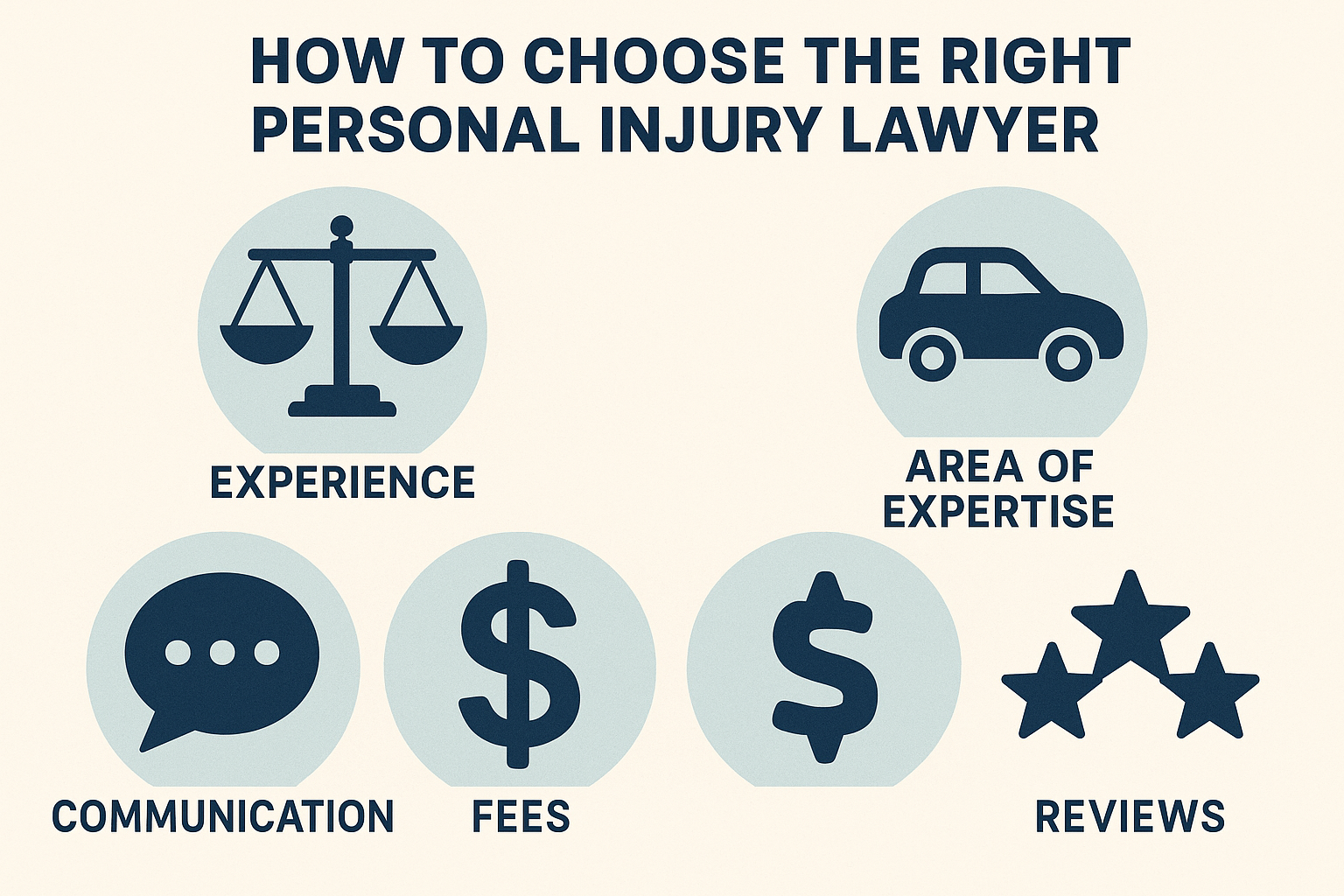How to Choose the Right Personal Injury Lawyer: 5 Key Considerations
Meta Description: Discover five crucial factors to evaluate when hiring a personal injury lawyer in the US, Canada, or the UK. Learn how to find a trusted advocate who will maximize your compensation and guide you through the legal process.
Introduction
Facing an injury caused by someone else’s negligence can be overwhelming. Medical bills pile up. Lost wages add stress. You need a skilled personal injury lawyer on your side.
The right attorney will fight for fair compensation and handle paperwork for you. In this guide, we’ll outline five essential criteria English-speaking clients should use to select the best personal injury lawyer in 2025.
1. Experience and Track Record
-
Years in Practice: Look for a lawyer with at least 5–10 years handling injury cases.
-
Case Results: Ask about verdicts and settlements. High-dollar wins indicate skill.
-
Courtroom Exposure: Even if most cases settle out of court, a lawyer who can litigate sends a strong message to insurers.
2. Area of Expertise
-
Specialized Practice: Injury law covers car accidents, medical malpractice, slip-and-fall, product defects, and more. Choose someone who focuses on your type of claim.
-
Local Regulations: Laws differ by state, province, and country. A local expert knows filing deadlines, caps on damages, and venue rules.
-
Sub-Specialties: Some attorneys concentrate on catastrophic injuries or wrongful death. Make sure your lawyer has handled cases like yours.
3. Communication and Accessibility
-
Initial Consultation: Most injury lawyers offer a free first meeting. Use it to assess their responsiveness.
-
Clear Explanations: A good lawyer breaks down legal terms into simple language. You should always understand your options.
-
Regular Updates: Choose a lawyer who commits to timely phone calls or e-mails. You deserve to know your case status at every stage.
4. Fee Structure and Costs
-
Contingency Fee Basis: Most personal injury attorneys work on contingency—no fees unless they win. Standard rates range from 25% to 40% of your recovery.
-
Additional Expenses: Clarify who pays court filing fees, expert witness fees, and investigation costs. Many firms advance these expenses and deduct them only if you win.
-
Fee Transparency: Read the retainer agreement carefully. Hidden fees or high percentages can reduce your net award.
5. Client Reviews and Reputation
-
Online Ratings: Check Google, Avvo, or LegalMatch for 4- to 5-star reviews.
-
Referrals: Ask friends, family, or other lawyers for recommendations.
-
Professional Recognition: Membership in trial lawyer associations or awards from Super Lawyers and Best Lawyers can signal peer respect.
How to Get Started
-
Gather Documents: Medical records, accident reports, witness contacts, and insurance correspondence.
-
Schedule Consultations: Meet at least three attorneys to compare fees, style, and confidence.
-
Ask Key Questions:
-
“How many cases like mine have you handled?”
-
“What is your success rate in court versus settlement?”
-
“Who will handle my case day to day?”
-
-
Review Contracts: Ensure fee percentages and expense policies are clearly stated.
Conclusion
Choosing the right personal injury lawyer can dramatically impact the outcome of your claim. Prioritize experience, relevant expertise, clear communication, fair fees, and strong reputation.
A dedicated attorney will shoulder the legal burden so you can focus on recovery and move forward with confidence.

